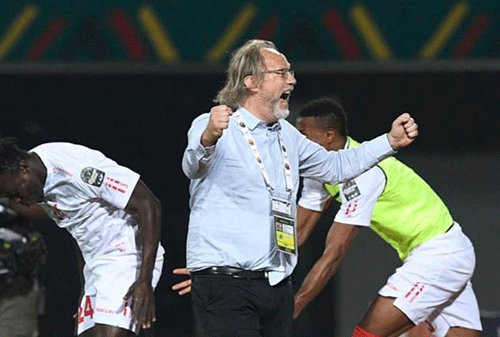Maqonda Ndlovu
Former Brave Warriors coach Tom Saintfiet says Namibian football players are not “hungry enough”, compared to their West African counterparts.
Saintfiet, who was recently in Namibia for a holiday with his family, is currently coaching The Gambia, one of the fastest-growing nations football-wise.
Speaking to New Era Sport, Saintfiet said most local players are happy to represent the African Stars, Black Africa or Orlando Pirates.
“Life is too easy here. Players have good-paying jobs; they earn good money, and the country is beautiful and safe with good medical care. It is fantastic to be in Namibia, so the target of going to Europe for a little bit more than what they earn here is not there. Not many players from Namibia want to go and battle the cold weather and know that they will never achieve something,” he said.
Saintfiet said these players are happy to play in South Africa, Zambia or Angola, instead of aiming to play in Europe, where infrastructure, training methods and competitions are way above what they experience in sub-Saharan Africa.
He added that in Gambia, most young men see football as an exit from poverty, as they would accept low-paying contracts in other West African countries or lower leagues in Europe as a way of trying to improve their lives.
“In Gambia, players between the ages of 14 and 16 get spotted very early. Not all of them make it, but those who go abroad improve their football skills and their lives with the wages they earn in Europe. In Namibia, the bar for the players is low,” he said.
He says the Gambia has a lot of refugees who cross from Libya to Europe to find a better life, and some of them try to achieve that via football.
“I have three players on the national team who are refugees. They want to have a better life, and they sacrifice a lot to achieve that. In Namibia, Collin Benjamin (the current Brave Warriors coach) is an example of how people can achieve their dreams in football. He went to Germany when he was young, played in the fourth division, and worked his way up until Hamburger SV in the Bundesliga, where he achieved so much,” Saintfiet explained.
He said the Namibian and Gambian leagues are the same, with the difference being that younger players are quickly scouted and taken abroad, where training facilities are better.
“The local leagues are similar; in Gambia, the younger players are playing in a development league to be scouted, while in Namibia, they play for big teams so that they can be called into the national team before going abroad,” he said.
Saintfiet said that during his time in Namibia, he never experienced any interference from the Namibia Football Association on how to do his job.
“My frustrations were the lack of money to play friendly matches or hold regular training camps. The players would be off for five to six months, and I felt we could not develop a competitive national team. John Muinjo and Barry Rukoro are two of the best administrators I have worked with worldwide,” he said.
He noted that African teams fail themselves due to a lack of planning.
The gangling Belgium said most federations fail to plan and organise logistics, which then affects the performance of players.
“I have seen it with most African football associations (FAs): the team qualifies for a tournament, but accommodation, transport and training programmes are always delayed. The European FAs’ plans are way ahead; hence, their teams always dominate international competitions, such as the World Cup,” he said. Saintfiet said while leaving Namibia was a mistake, his travels have opened his eyes, and he would like to come back and coach the Brave Warriors, whom he said he would like to see in Ivory Coast. He coached Namibia from 2008 to 2010 before leaving for Zimbabwe, where his stay was short-lived, as the government in that country rejected his work visa application in favour of a local coach.
He went on to coach in various African countries, including Ethiopia, Malawi and Togo. Internationally, he coached in Bangladesh, Malta as well as in Trinidad and Tobago.
He joined the Gambia in 2008 and led them to the 2021 Africa Cup of Nations.


